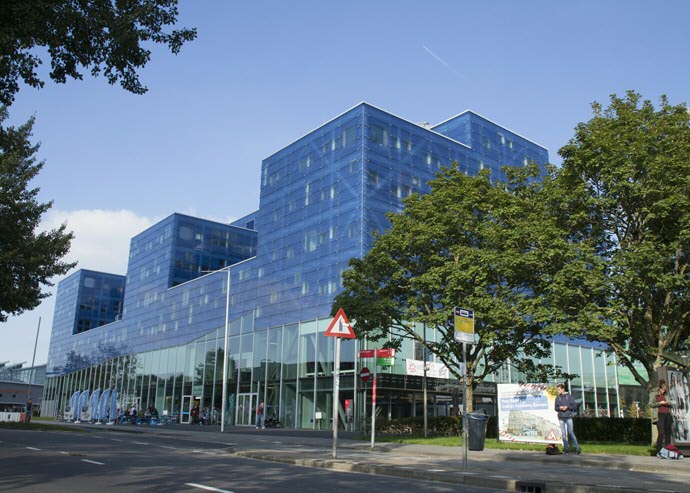Slimme systemen besparen energie en geld

Promovendus Ilche Georgievski heeft de Bernoulliborg op de Zernike Campus van de Rijksuniversiteit Groningen gebruikt als een ‘levend laboratorium’ om systemen te ontwikkelen die energie en geld kunnen besparen. De resultaten, die toepasbaar zijn op allerlei andere gebouwen, kunnen een gemiddelde besparing op de energierekening van 35 procent opleveren. In de kantine van de Bernoulliborg wist Georgievski zelfs 80 procent stroom te besparen. Hij verdedigt zijn proefschrift waarin hij de systemen achter deze besparingen beschrijft op 9 oktober 2015 aan de RUG.
Het promotieonderzoek van Ilche Georgievski was onderdeel van het project ‘Energy Smart Systems’ van onderzoeksfinancier NWO en vond plaats bij de afdeling Distributed Systems van het Johan Bernoulli Instituut voor wiskunde en informatica. Doel was om een systeem te ontwikkelen dat het energiegebruik van kantoorgebouwen efficiënter maakt zonder dat de mensen er last van hebben.
Koffiehoek
Georgievski hield een tijdlang het energiegebruik bij van verschillende apparaten en systemen in kantoren en een koffiehoek op de vijfde verdieping van de Bernoulliborg. ‘We verzamelden gegevens over energiegebruik en het binnen- en buitenmilieu. De volgende stap was te beredeneren wat we hiermee konden doen’, legt Georgievski uit. Door het gedrag van bijvoorbeeld computers, printers en de magnetron in de koffiehoek te modelleren en daarbij de dagelijks routine van de gebruikers te betrekken was hij in staat om een intelligent systeem te bouwen dat het energiegebruik regelt.
Piek energiegebruik
‘Neem de magnetron. Die is vooral in gebruik tijdens lunchtijd, tussen 12 en 2. Hij gebruikt een boel energie en dat juist op een tijdstip waarop de energieprijs piekt.’ Door in deze periode niet-essentiële apparatuur, zoals de oplader van een laptop, uit te zetten wist Georgievski de piek in het energiegebruik af te vlakken. ‘Een andere aanpassing is dat we de boiler tijdens de nacht uitschakelen, dan gebruikt niemand warm water. Dit soort aanpassingen scheelt al zo’n 10 procent in energieverbruik.’
Slim energienet
Bij zijn test in de kantoren van de Bernoulliborg gebruikte Georgievski gegevens van de Amerikaanse energiemarkt, waar energie per uur van verschillende aanbieders is te kopen via een ‘slim energienet’. Vergeleken met de huidige situatie in Nederland, met één vaste energieleverancier, bleek hij een besparing in geld van gemiddeld 20 procent te kunnen halen bij gebruik van ‘grijze’ energie en van 35 procent voor groene energie.
Besparing 80 procent
Een tweede project was alleen gericht op het besparen van energie. ‘In de kantine van de Bernoulliborg gingen de lichten om half zeven ’s ochtends aan, en om acht uur ’s avonds weer uit. Maar buiten lunchtijd zaten er doorgaans maar weinig mensen.’ Dus liet Georgievski bewegingssensoren en lichtsensoren plaatsen. ‘Die leveren informatie op over waar zich mensen bevinden, en hoeveel licht er van buiten komt.’ Met deze informatie kan een computersysteem lichten uitschakelen op plekken waar niemand aanwezig is, of waar voldoende natuurlijk licht naar binnen valt. De besparing in energiegebruik was maar liefst 80 procent.
Algoritme
Dit klinkt allemaal simpel, maar het ontwerpen van een slim systeem dat het energieverbruik regelt is nogal ingewikkeld. ‘Neem een kantoor met tien stroomverbruikers die aan of uit kunnen. Dat levert al duizenden combinaties op. Mijn algoritme is in staat om in milliseconden de beste combinatie te vinden.’
Nieuw bedrijf
De systemen die Georgievski heeft ontwikkeld, zijn bruikbaar in verschillende omgevingen, zoals kantoren of woonhuizen. Ze zijn nu onderdeel van een nieuw bedrijf dat vanuit de RUG is opgestart: Sustainable Buildings. Dit wordt geleid door twee van zijn collega’s, Tuan Anh Nguyen en Faris Nizamic, voormalig winnaars van de Green Mind Award van de RUG. Georgievski werkt inmiddels als postdoc bij de RUG aan een ander door NWO gefinancierd project, Smart Energy in Smart Cities.
Meer informatie
Ilche Georgievski verdedigt zijn proefschrift Coordinating services embedded everywhere via hierarchical planning op vrijdag 9 oktober 2015 om 11.00 uur aan de Rijksuniversiteit Groningen. Zijn promotor is prof.dr.ir. Marco Aiello.
Over zijn onderzoek verscheen eerder een Unifocusvideo: Kantoren kunnen nog slimmer
Meer nieuws
-
27 januari 2026
ERC Proof of Concept grant voor Maria Loi
-
26 januari 2026
Wetenschap Werkt | De AI-chip van de toekomst
